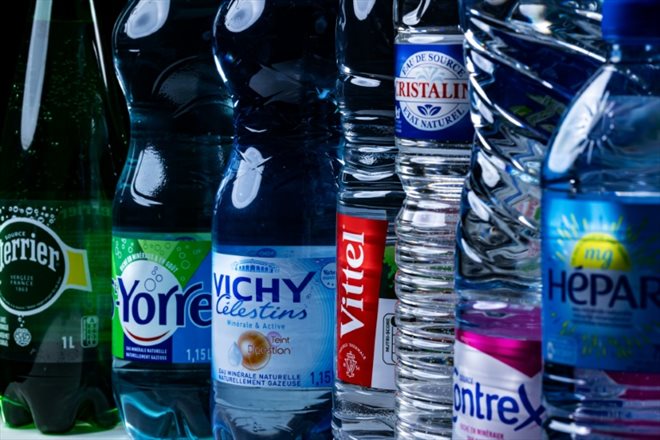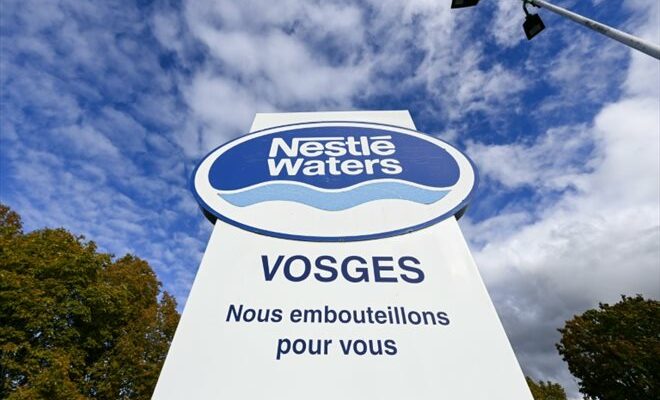the health agency Anses recommends “reinforced surveillance” of the water collection sites of the Swiss agri-food giant Nestlé due to “an insufficient level of confidence” to ensure “the health quality” of mineral waters (AFP/ Archives/JEAN-CHRISTOPHE VERHAEGEN)
Additional blame for Nestlé: the health agency Anses recommends “reinforced surveillance” of the Swiss agri-food giant’s water collection sites due to “an insufficient level of confidence” to ensure “sanitary quality” mineral waters.
The National Agency for Food, Environmental and Occupational Health Safety (ANSES) advocates “the establishment of a reinforced surveillance plan which will contribute to having reliable microbiological and chemical measurements”, in a note transmitted in mid-October to the Ministry of Health, revealed Thursday morning by Le Monde and Franceinfo, of which AFP obtained a copy.
According to the referral letter to ANSES by the regional health agencies (ARS) of Occitanie and the Grand-Est, dated April 28, 2023, appearing in the annex to the note, the company in question is Nestlé.
In the rest of the document, all mentions of the brands and sites concerned are hidden.
ANSES confirmed to AFP that it had been contacted by these two ARS to “determine the conditions for reinforced monitoring of packaged water sectors” and that it had sent its conclusions to the Ministry of Health on October 16, 2023, but specified that “many elements being covered by business secrecy, it was agreed that the expertise would not be made public”.

Bottles of mineral water from brands belonging to the Nestlé Waters group, February 21, 2024 in Paris (AFP/JOEL SAGET)
Contacted by AFP, Sophie Dubois, general manager of Nestlé Waters France assures that this note “has not been brought to (her) attention” and wishes “to reaffirm loud and clear that (…) all mineral waters natural products placed on the market in France under the brands Hépar, Contrex, Vittel or Perrier can be consumed in complete safety.
Hépar, Contrex and Vittel are bottled in the Vosges, while Perrier is bottled in Vergèze (Gard).
“There is no subject on food safety,” insists the manager. It mentions the possibility of the presence of “residual traces” of pesticides, but “very significantly lower than the standards in force for mineral waters”.
For its part, the CGT of Nestlé Waters Supply Est (NWSE) “requested the holding of an extraordinary CSE in order to have explanations from management as quickly as possible”.
– Contaminations of fecal origin –
On the basis of the data provided by the two ARS, ANSES notes “multiple findings of microbiological contamination of fecal origin” at the source level, which make it necessary “reinforced surveillance extended to a panel of parameters which will make it possible to specify the vulnerability of resources to contamination by waterborne pathogenic viruses.

The Nestlé Waters logo on its Vittel bottling site, in the Vosges, October 24, 2023 (AFP/Archives/JEAN-CHRISTOPHE VERHAEGEN)
This note comes as a preliminary investigation for deception is opened by the Epinal public prosecutor’s office against Nestlé Waters, suspected of having used illegal treatments to purify its mineral waters, following initial revelations from the World and Radio France.
The referral to ANSES by the health authorities comes “following the identification by the public authorities on various operating sites of the presence of treatment systems upstream of the monitoring points set up following a deterioration of the quality of resources”, underlines the agency in its note.
“There is no confidence, we must stop marketing and recall the bottles,” argues the consumer defense association Foodwatch.
“Concerning finished products, bottled water, no recommendation is made”, specifies ANSES, however, before adding that the presence in “positive values” or “beyond regulatory thresholds” of microbiological or chemical elements “other than those constitutive and characteristic of mineral water (…) should not lead to the production of bottled water in order to guarantee the health quality of the natural mineral waters produced”.
The regulations concerning the quality criteria of natural mineral waters are stricter than those concerning tap water, whether at the time of collection or once in bottles.
A 2007 decree thus indicates that “at the emergence and during their marketing, water must be free of germs indicative of fecal contamination, parasites and pathogenic microorganisms”.
In its conclusions, ANSES places the responsibility on the ARS of Occitanie and Grand-Est to “make the choice between the monitoring requirements that they intend, depending on the case, to suggest or prescribe to operators, and the recommendations that they will implement as part of the health control that they will sponsor.
Contacted by AFP, the Ministry of Health did not respond to requests.
apz-hrc-uh-ito/abb/nth
© 2024 AFP
Did you like this article ? Share it with your friends using the buttons below.




